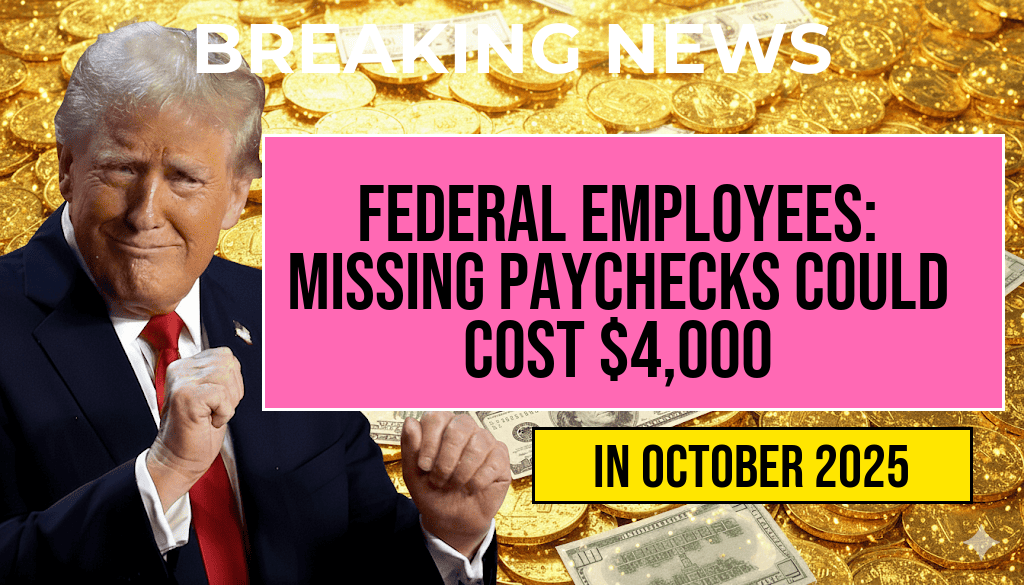Federal Employees Facing Two Missed Paychecks Could Lose Up to $4,000 — Here’s What You Need to Know
A significant number of federal employees are discovering that missing two consecutive paychecks can lead to substantial financial hardship, especially for those at GS-12 grade levels. For many, the potential loss of roughly $2,000 per paycheck could total around $4,000, creating urgent concerns over bills, rent, and everyday expenses. The disruption stems from ongoing government funding issues, including shutdowns or delayed appropriations, which can temporarily halt payroll processing. Employees are urged to understand their options, including potential relief measures and steps to mitigate the impact. This article explores the circumstances leading to missed pay, the immediate financial repercussions for GS-12 employees, and concrete actions employees can take to navigate this challenging situation.
Why Are Paychecks Being Missed?
Federal employees typically receive their paychecks biweekly, with payroll processed through the Treasury Department’s systems. When government funding lapses—such as during a shutdown or funding delays—payroll operations can be disrupted. Recent budget standoffs in Congress have resulted in temporary closures of certain federal agencies, leading to delays in processing or disbursing wages.
Although most employees continue working during such periods, the timing of paycheck issuance can be affected. For some, this results in one missed paycheck; for others, especially during extended shutdowns, two or more pay periods may pass without salary deposits. Such delays are particularly impactful for GS-12 employees, who generally earn between $65,000 and $85,000 annually, translating to roughly $2,600 to $3,400 per biweekly paycheck, depending on locality pay and specific role.
Financial Impact on GS-12 Employees
Missing two paychecks can cause a significant financial strain, especially for those with tight budgets or existing debt. For GS-12 employees, the cumulative loss of up to $4,000 could jeopardize mortgage or rent payments, utility bills, car loans, or even essential groceries.
| Component | Range |
|---|---|
| Low end (annual $65,000) | $2,600 per paycheck |
| High end (annual $85,000) | $3,400 per paycheck |
For employees at the higher end of the GS-12 scale, missing two paychecks could mean a shortfall of nearly $6,800 annually, which can be devastating if not addressed promptly. The ripple effect may also extend to missed payments on credit cards and loans, leading to increased interest and potential credit score impacts.
What Actions Can Federal Employees Take?
Employees facing this situation should act swiftly to minimize financial damage. Here are critical steps to consider:
1. Contact Your Agency’s Human Resources or Payroll Office
Immediate communication can clarify whether delays are temporary or if alternative arrangements are available. Some agencies might offer advance payments or emergency loans, especially during government shutdowns.
2. Explore Emergency Financial Assistance Programs
Federal employee unions and associations often coordinate relief efforts, including short-term loans or grants. Additionally, some private charities and community organizations provide emergency assistance for federal workers in crisis.
3. Review and Adjust Budget Priorities
Prioritize essential bills such as housing, utilities, and groceries. Consider reaching out to creditors and service providers to explain the situation; some may offer deferred payment options or hardship programs.
4. Utilize Federal Resources and Support
The [Office of Personnel Management (OPM)](https://www.opm.gov/) provides guidance during funding disruptions, including updates on pay status and available resources. The [Federal Employee Education and Assistance Fund (FEEA)](https://feea.org/) offers emergency aid programs tailored for federal employees facing financial difficulties.
5. Seek Loan Options Carefully
While payday loans or high-interest personal loans may seem tempting, they often exacerbate financial strain. Instead, consider lower-interest options like credit union loans or borrowing from family or friends.
Legal and Policy Considerations
Federal employees are protected by specific regulations that govern pay during government shutdowns or funding delays. When pay is missed due to government inaction, employees remain entitled to back pay once funding resumes, according to the [Fair Labor Standards Act](https://en.wikipedia.org/wiki/Fair_Labor_Standards_Act). However, the interim period can still be stressful and financially damaging.
Employees can also consult with their agency’s personnel office or union representatives regarding rights and potential legal remedies. The Federal Employee Defense Fund provides resources and advocacy for workers affected by shutdown-related issues.
Looking Ahead: Preventive Measures and Preparedness
Given the recurring nature of federal funding debates, employees are encouraged to build emergency savings where possible. Financial advisors suggest setting aside at least three months’ worth of living expenses to cushion against unexpected disruptions.
Additionally, staying informed about the federal budget process and any impending funding lapses can help employees prepare in advance. Regularly checking official government websites, such as [Congress.gov](https://www.congress.gov/) and agency-specific alerts, ensures timely awareness of potential pay disruptions.
Key Takeaways
- Missing two paychecks could result in a loss of up to $4,000 for GS-12 federal employees.
- Timely communication with agency HR and payroll offices is crucial.
- Exploring emergency assistance programs and adjusting budgets can help mitigate immediate financial burdens.
- Employees should stay informed about government funding developments and plan accordingly to reduce future risks.
Staying proactive and leveraging available resources can help federal employees navigate the financial challenges posed by delayed paychecks, ensuring they maintain stability during uncertain times. For additional guidance, employees are encouraged to consult official government resources and financial planning experts.
Frequently Asked Questions
Question
What are the potential financial impacts for GS-12 federal employees missing two paychecks?
Question
How can federal employees prevent or address issues related to missed paychecks?
Question
What steps should a GS-12 employee take if they miss a paycheck?
Question
What are the common reasons for pay disruptions among federal employees?
Question
Where can federal employees find assistance or resources regarding pay issues?

Leave a Reply